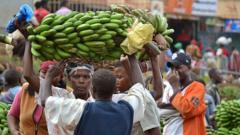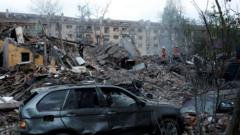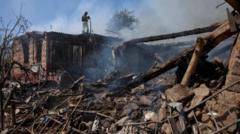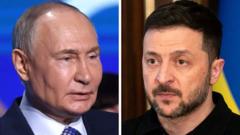Efforts to broker a ceasefire in the ongoing conflict between Russia and Ukraine have been complicated after the inclusion of significant U.S. figures was downgraded from the London meetings, sparking new debates around territorial concessions.
Ceasefire Negotiations Between Russia and Ukraine in London Experience Setback

Ceasefire Negotiations Between Russia and Ukraine in London Experience Setback
Ongoing diplomatic discussions among world leaders face challenges as key US officials are sidelined from talks in London.
Negotiations aimed at achieving a ceasefire between Ukraine and Russia in London have hit a snag, following the withdrawal of US Secretary of State Marco Rubio and special envoy Steve Witkoff from key discussions. The upcoming meeting, which is scheduled for Wednesday, will now involve senior officials from the UK, France, Germany, Ukraine, and the US, while UK Foreign Secretary David Lammy is set to convene directly with his Ukrainian counterpart. Instead of Rubio and Witkoff, General Keith Kellogg, a former envoy for Ukraine under Trump, will represent the US.
In a related development, Ukrainian President Volodymyr Zelensky has firmly dismissed any discussions regarding the potential recognition of Crimea as Russian territory, amid reports suggesting such concessions could be on the table during the talks. Tensions continue to mount as speculation arises regarding Russia's willingness to cease its military offensive along established front lines in exchange for significant political concessions, including potential US endorsement of Russian claims over Crimea.
Despite optimistic statements on Tuesday from Rubio, who described conversations with Lammy as "productive," clarity on the future of discussions remains elusive. Lammy emphasized the urgency of the situation for Ukraine and Euro-Atlantic security, which has led to calls for a return to negotiations.
The UK Foreign Office released a statement on Wednesday confirming the postponement of talks between foreign ministers, stating only that lower-level discussions would persist behind closed doors. Concurrently, the White House has announced Witkoff's forthcoming travel to Moscow for his fourth discussion with Russian President Vladimir Putin.
Zelensky reiterated that Ukraine will not entertain any proposal that includes recognizing Crimea as Russian-occupied land, emphasizing the nation's legal stance against recognizing the annexation. As Ukrainian officials prepare to enter the London meeting with a clear mandate for a ceasefire, the atmosphere is mixed with skepticism regarding the outcome.
While Ukraine’s Ministry of Strategic Industries adviser, Yuriy Sak, noted it would be unrealistic for Ukraine to alter its position on fundamental issues, ongoing military activities have continued to escalate. Reports confirm that a Russian drone strike in the city of Marhanets resulted in nine civilian deaths, underscoring the ongoing threat to civilian security within conflict regions. Since Russia's invasion began on February 24, 2022, the toll has been devastating, with estimates suggesting hundreds of thousands of casualties and nearly seven million displaced Ukrainians.
The long-standing conflict, which reignited following the 2014 ousting of Ukraine's pro-Russian president and Russia's subsequent annexation of Crimea, faces a complex and challenging path ahead as both sides continue to jockey for position in the fluctuating landscape of geopolitical negotiations.




















